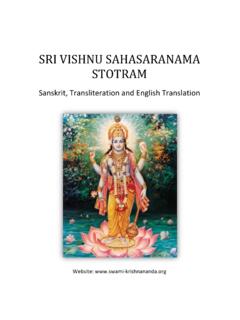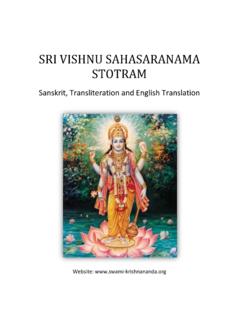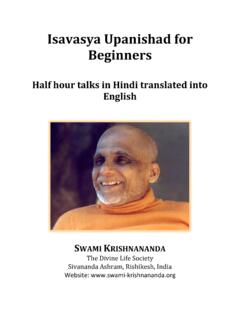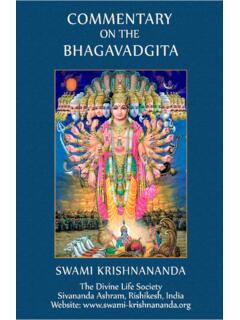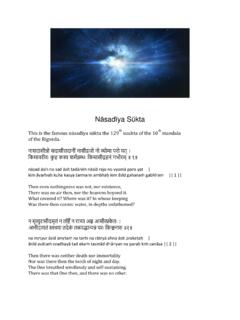Transcription of Glossary of Sanskrit Terms - Swami Krishnananda
1 Glossary OF Sanskrit Terms Swami SIVANANDA The Divine Life Society Sivananda Ashram, Rishikesh, India Swami Krishnananda s website: A Abhanavarana: Screening the outshining Bragman; one of the two Avarana Saktis which is removed by Aparoksha Jnana. Abhasa: Reflection, appearance, semblance, not true. Abhasamatra: In name only. Abhasavada: Doctrine holding that all creation is reflection of the Supreme Reality. Abhati: Shines, illumines. Abhava: In which one s self is meditated upon as zero or, as bereft of every quality or limitation whatsoever; absence; non-existence; negation.
2 Abhavamatra: Of a merely negative character. Abhavana: Non-thought. Abhava padartha: A thing which cannot have existence in reality, viz., horn of a hare, son of a barren woman. Abhavarupavritti: The function of thinking of a non- existent thing. Abhayadana: Gift (boon) of fearlessness. Abhayam: Fearlessness. Abheda: Non-difference. Abheda-ahamkara: The pure ego that identifies itself with Brahman or the Absolute. Abheda-bhakti: Highest devotion that has culminated in the identity of the worshipper and the worshipped; devotion without the sense of duality. Abheda-buddhi: The Buddhi that beholds unity.
3 Abheda-chaitanya: Constant thought of the identity of the soul with Brahman; undivided Consciousness. Abheda-jnana: Knowledge of the identity of the individual with the Absolute (Atman and Brahman). Abhedabhava: Sense of non-separateness. Abhigamana: Approach to the temple. Abhijna: Direction; perception or recollection assisted by memory. Abhijna-Jnana: Knowledge through perception. Abhimana: Egoism; identification with the body. Abhimani: One who has egoistic feeling. Abhinaya: Controlling; training; disciplining. Abhinivesa: Clinging to earthly life; will to live. Abhivimana: As identical with himself; an epithet of the unlimited Supreme Being.
4 Abhivyakta: Manifested. Abhokta: Non-enjoyer. Abhyantara: Internal. Abhyasa: Repetition; practice; one of the Shad Lingas. Abhyasin: Yoga-practitioner; one who studies Veda. 2 Abhyudaya: Exaltation. Abuddhi-purva: Unintelligent; insentient. Achala: Not moving; fixed. Achamana: Sipping water from the hollowed palm o the hand; a preliminary simple rite connected with ritualistic worship. Achara: Right conduct, custom, practice, external observance of established rules and laws. Acharana: Observance of right conduct. Acheta: Unintelligent. Achetana: Unconscious. Achintya: Unthinkable.
5 Achintya Sakti: Inscrutable power. Achit Sakti (of Brahman): Tamas or great darkness; the root of matter. Achit: Inanimate matter. Achit vastu: Non-sentient matter. Achyuta: The indestructible; the unchanging. Adambhitva: Unpretentiousness. Adbhuta: Wonderful. Adhama: Low; degraded. Adhama uddharaka: Uplifter of the down-trodden. Adharma: All that is contrary to the right and the law; demerit. Adarsa: Ideal. Adarsa-purusha: A person whom you can take as an ideal; an exemplary person. Adesa: A divine command from within the being. Adhara: Support; basis; Brahman; also, the system corn posed of the five principles constituting the physical, vital, 3 mental, intellectual and the blissful sheaths; receptacle; that which supports.
6 Adhara-adheya-sambandha: Relation of the support and the thing supported; relation of location and the thing located; relation of abode and abiding. Adhi: Disease of the mind. Adhibhautika: Elemental. Adhibhautika sarira: Body composed of elements. Adhibhautika Taapa: Pain caused by the Bhutas, as scorpion-sting, snake-bite, etc.; nature-extrinsic suffering. Adhibhuta: Pertaining to the elements; the primordial form of matter. Adhibhuta-vidya: Science of the physical or material world. Adhidaiva-vidya: Science of the heavens. Adhidaivika: Pertaining to the heaven or the celestial beings.
7 Adhidaivika Taapa: Pain caused by gods or the heavens as thunder, rain, flood, etc. Adhika: Additional. Adhikarana: Section; topic; substratum; receptacle. Adhikari: Qualified person. Adhikari-vada: The doctrine upholding the necessity of prescribing a distinct course of discipline for each spiritual aspirant according to his capacity. Adhimatra (Vairagya): Degree of Vairagya when worldly enjoyment even becomes a source of pain. Adhipatipratyaya: The defining cause. Adhishthana: Background; support; basis; substratum; repository (Brahman); underlying truth or essence. 4 Adhishthatri Devata: Presiding divinity.
8 Adhiyajna: Pertaining to the sacrifice. Adhokshaja: A being who cannot be perceived by the outer senses; a name of Bhagavan Narayana. Adhvaryu: A priest who recites the Yajur-veda in a sacrifice. (Yajur-veda is one of the four Vedas or source-scriptures of Hinduism. The others are Rig-veda, Sama-veda and Atharvana-veda.) Adhyaksha: Agent; supervisor. Adhyatmika: Pertaining to the Atman. Adhyatmika Vidya: Science of Self. Adhyaropa: Illusory attribution; superimposition; false attribution; one thing is mistaken for another; qualities of one are transferred to another; qualities of the Self arf transferred to the body.
9 Adhyaropita: Fictitiously ascribed. Adhyasa: Superimposition or reflection of the attributes of one thing on another thing. Adhyasta: Falsely-cognised thing. Adhyasta astitva: Reflected existence. Adhyatma Sastra: Spiritual science. Adhyatma Vidya: Science of the Self. Adhyatmavit: Knower of the Inner Self Adhyavasaya: The determining function of the Buddhi or the intellect. Adi-tattva: The first principle; Brahman; Mula Prakriti; the first element (of matter) next but one above Akasa in the gradation of subtlety. Aditya: Sun-god; Sun; a class of celestial beings. Adrishta: The unseen principle.
10 5 Adrishtam: Unperceived. Adrisya: That which cannot be perceived by the physical eye (Brahman). Advaita: Non-duality; monism. Advaita-avastharupa-samadhi: Nirvikalpa Samadhi of Advaitins where there is no Brahmakara Vritti. [This is the highest superconscious state in which there is no triad (knowledge, knower and known), but One alone exists in Its own state.] Advaita nishtha: Establishment in the state of non-duality. Advaita-siddhi: Realisation of the non-dual Brahman or Oneness. Advaita vada: The theory that Brahman is the only existence; monism; Vedanta. Advaita vedanta: Non-dualistic philosophy (of Sri Sankara.)
